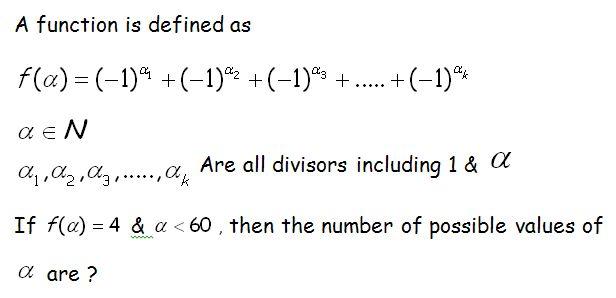 1
1dude firstly question needs one more condition to be mentioned as it stands...that whether all alpha-1,.....,alpha-n are all distinct or not
as nothing is mentioned i m assuming all alpha-1,aplha-2,.......alpha-n are not all distinct
in this case number of possible values of alpha are 29.
 1
1Actually I have copied the Question Exactly as it is given in the Brilliant Tutorials All India Test Series
But If You Ask Me I Think
alpha-1,aplha-2,.......alpha-n are ALL DISTINCT
it was a Matrix Match Question
and the in other three i got the right answer by taking them all distinct
It is given the Answer is "4" but i cannot figure it out
 1
1thanx ironman...now trying the problem assuming them all distinct....yup when they are all distinct the number will drastically decrease as u already mentioned!
 1
1ok finally over with the analysis:[i may be wrong!!!!]
aplha=24 is ony possible number below 60 such that f(alpha)=4
as per me.......only ONE possible alpha....either answer or problem should be wrong!
 62
62Hint and part solution: No of Even Divisors - No of Odd Divisors = 4
Let the number be of the form 2p13p25p3....
No of even divisors = P1(p2+1)(p3+1).....
No of Odd Divisors = (p2+1)(p3+1).....
Now can you try?
 1
1thanx prophet sir and nishant sir.
i m an idiot...i was using number theory idiotically and so wrongly concluded that 24 was only number....i did use the form given by nishant sir....but rather than using it in general form i simply stuck with
using both two and three only and forgot the cases where two alone...and when five are involved[2].
sorry to waste ur time ironman[2]
